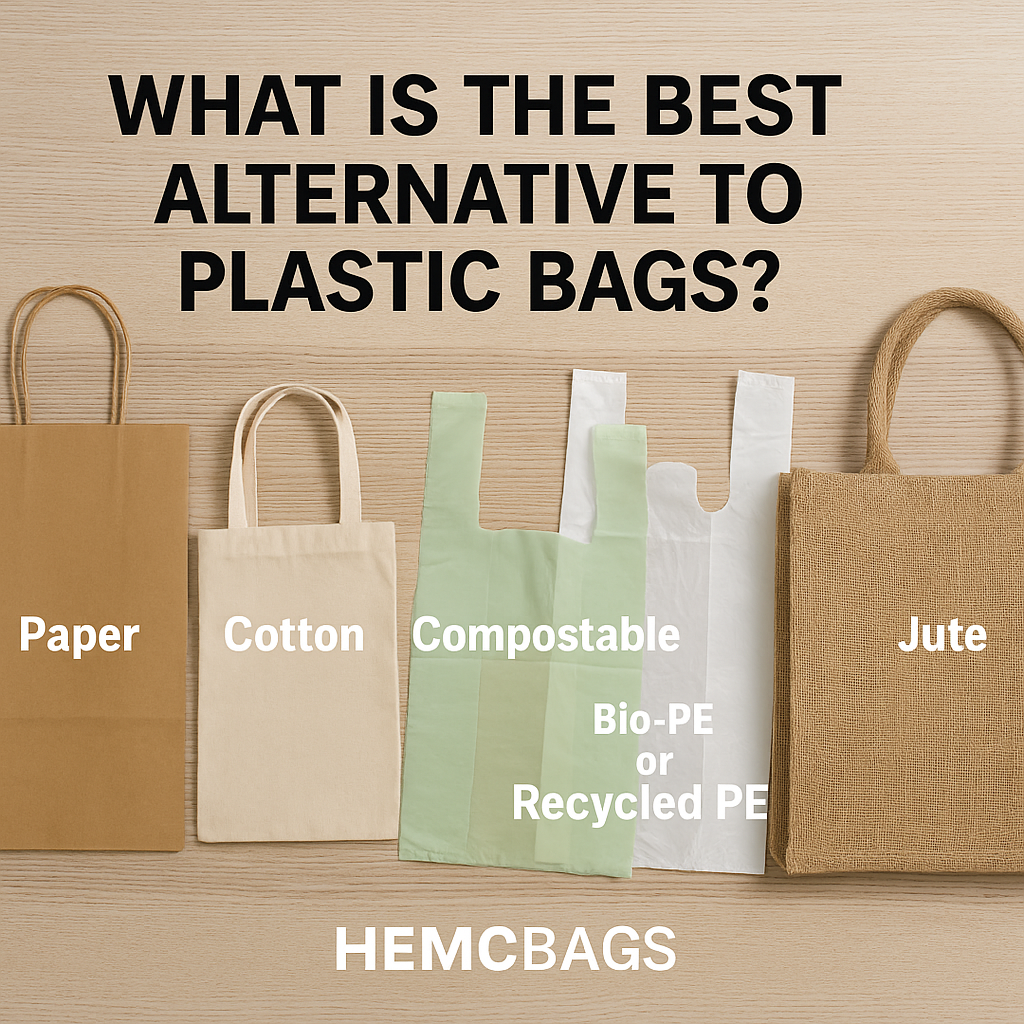In the post-plastic era, businesses across the world are rethinking one question: What is the best alternative to plastic bags? Not just for the sake of sustainability, but also for brand credibility, regulatory compliance, and long-term cost efficiency.
You can Google a list of alternatives—paper, cotton, jute, compostable—but the real question is: Which option fits your business, your supply chain, and your customer base best? As a supplier working with importers and eco-conscious brands globally, here’s what I’ve learned after hundreds of orders and factory trials.
Table of Contents
Toggle1. Not All Alternatives Are Created Equal
Let’s break it down.
| Material | Biodegradability | Strength | Custom Branding | MOQ | Certifications |
|---|---|---|---|---|---|
| Paper Bags | Home compostable | Medium | Excellent | Low | FSC, OK Compost |
| Cotton Bags | Reusable, non-compostable | High | Good | High | GOTS |
| Compostable (PLA, PBAT) | Industrially compostable | Medium | Good | Medium | EN 13432, ASTM D6400 |
| Bio-PE or Recycled PE | Not compostable | High | Good | Medium | Recyclable only |
| Jute or Canvas | Durable but bulky | Very High | Poor for detail | High | Often uncertified |
Many customers assume compostable = suitable. But the ideal material varies by product type, end-user habits, and disposal infrastructure. For instance, if your customers don’t have access to industrial composting, PLA-based bags won’t degrade properly—defeating the purpose.
2. The “Best” Alternative Depends on Who You Are
Are you a pet product brand? You’ll need leak-proof liners and odor control.
A grocery chain? You’ll want strength, affordability, and fast-degrading carry bags.
A premium lifestyle brand? Your buyers care about texture, luxury, and long-term reusability.
Tailored Suggestions:
- Pet Brands → Home-compostable starch-based bags with high puncture resistance.
- Retail Chains → PBAT/PLA blends with printed branding, EN13432 certified.
- Eco-Focused Startups → Kraft paper + PLA lining; fully home compostable and minimalistic.
- Food Delivery Services → Dual-layer compostable film bags with heat seal and moisture barrier.
3. Watch Out: The Greenwashing Trap
Many “eco” bags on Alibaba or Amazon are labeled biodegradable, but they contain oxo-degradable additives—meaning they break into microplastics, not disappear.
Here’s how to spot the difference:
- Look for certifications, not just marketing words. If a bag says “biodegradable” but lacks EN13432 or ASTM D6400, it might just be greenwashing.
- Check supplier transparency: Do they show raw material origin, resin composition, test reports?
- Avoid vague terms like “eco-plastic” or “partially degradable.” Those usually don’t meet legal or sustainability standards in the EU or US.
4. How hemcbags Helps Importers and Brands Make the Right Choice
At hemcbags, we don’t just sell bags. We help you choose the right material for your target market, price point, and compliance zone.
- MOQ Flexibility: Test new markets with 5000pcs instead of 50,000.
- Regulation-Ready Products: All compostable products tested under EN13432, OK Compost, or ASTM D6400.
- Real Support: We’ve helped UK clients transition from PE to PLA bags without increasing unit cost, simply by optimizing roll size and packing.
- Trend Tracking: We monitor EU SUPD, France’s plastic ban, California AB 1201, etc. so you don’t have to.
5. The Real Best Alternative? It’s a Strategy, Not Just a Material
The best alternative to plastic bags is not one single material—it’s the right combination of:
- Materials (compostable, recycled, paper)
- Formats (flat bag, zip lock, drawstring, roll)
- End-of-life planning (home compost, industrial compost, reuse, recycling)
- Transparent supply chain (certified and documented)
If you’re thinking long-term, choose a solution that aligns with your brand’s sustainability promise and local waste system—not just the cheapest price.
Final Thought: Want Real Options That Work for Your Business?
If you’re tired of generic suggestions and want a real-world supplier perspective tailored to your goals, feel free to reach out. We’re happy to help you:
- Compare materials side by side
- Share real cost-per-unit benchmarks
- Send certified compostable samples for testing
👉 Visit hemcbags.com to explore our product range or send us your specs for a quick, professional quote.
Let’s make sustainability practical, profitable, and credible—together.

